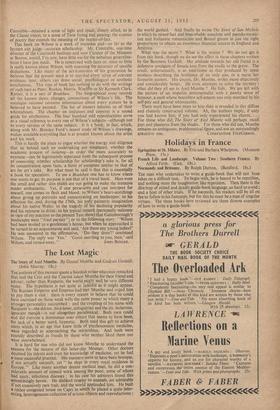• The Lost Magic
The Story of Axel Munthe. By Gustaf Munthe and Gudrun Uexhiill. (John Murray. 18s.) THE authors of this memoir quote a Swedish writer who once remarked that had the Czar and the Czarina taken Munthe for their friend and adviser, rather than Rasputin, the world might well be very different today. The hypothesis is not quite as fanciful as it might appear. The Russian Emperor and Empress had met Munthe and urged him to pay them a visit : there is every reason to believe that he could have exercised on those weak wills the same power to which many a stronger personality succumbed : and the coupling of his name with Rasputin's—the doctor, bird-lover, antiquarian and the sly, lecherous, ignorant moujik—is not altogether paradoxical. Both men could and did exercise a dominance over others that seems to have been, for lack of a better word, hypnotic. Both used this gift to achieve cures which, in an age that knew little of psychosomatic medicine, were regarded as approaching the miraculous. And both were roundly described as frauds by those who neither liked them nor were overwhelmed.
It is hard for one who did not know Munthe to understand the reasons for the success of this latter-day Mesmer. Other doctors doubted his talents and even his knowledge of medicine, yet he had a most successful practice. His manners seem to have been brusque, if not actually uncouth, yet " he slept in every royal residence in Europe." Like many another decent medical man, he did a con- siderable amount of unpaid work among the poor, some of whom had nasty, infectious diseases : in his case his admirers found this astonishingly heroic. He disliked cruelty to animals, an admirable if not excessively rare trait, and the world applauded him. He built a rather congested house on Capri in whith he placed a quite inter- esting, heterogeneous collection of artistic objects and reproductions : the world gushed. And finally he wrote The Story of San Michele in which he mixed fact and improbable anecdote and pseudo-mystic- ism and Italianate romanticism and Boreal gloom in just the right proportions to obtain an enormous financial success in England and America.
What was the secret ? What is the receipt ? We do not get it from this book, though we do see the effect in those chapters written by the Baroness Uexhtill. Her attitude towards her old friend is a defensive amalgam of female love from the cradle to the grave. The result, unfortunately, is as wearisome as that produced by some mothers describing the brilliance of an only son, or a nurse her favourite patient. His cousin, Dr. Munthe, writes more objectively and considerably better. He even attempts to solve the mystery : what did they all see in Axel Munthe ? He fails. We are left with the picture of an impolite sentimentalist with a pawky sense of humour, a snob whose boundless self-esteem was only matched by his self-pity and general whimsicality.
There must have been more to him than is revealed in this diffuse and clumsily constructed volume. Ah, the authors imply, if only you had known him, if you had only experienced his charm. ... For those who did, The Story of Axel Munthe will perhaps recall joys and pleasures from the shades. For those who did not, Munthe remains an ambiguous, problematical figure, and not an outstandingly


























 Previous page
Previous page